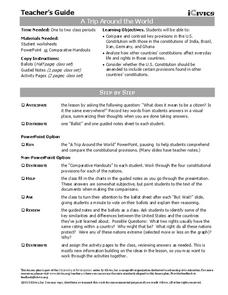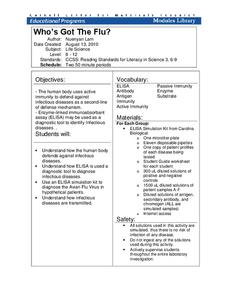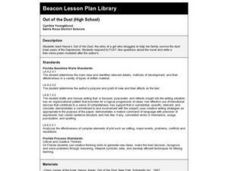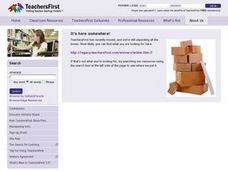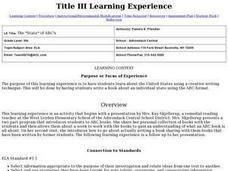Curated OER
Lesson Four: Comparatives and Superlatives
Put on your best smile, or a least a better one, for this lesson on superlatives and comparatives. English language learners first fill out a graphic organizer by finding other people in the class who are taller than they are, shorter...
iCivics
A Trip Around the World
How do the rights of citizens in other countries, such as India, Germany, Brazil, and Iran, compare to those of Americans? Take a closer look at the provisions of various foreign constitutions, and compare and contrast the protections...
Illustrative Mathematics
Logistic Growth Model, Abstract Version
Here learners get to flex some serious algebraic muscles through an investigation of logistic growth. The properties of the constant terms in the logistic growth formula are unraveled in a short but content-dense activity. Moving...
Cornell University
Who’s Got The Flu?
Become an immunologist for the day. Scholars elicit the use of the enzyme-linked immunoabsorbent assay (ELISA) to diagnose an infectious disease. Through the process, they learn about the immune system response to infectious diseases.
EngageNY
How to Write Like a Scientist in the Field: Introduction to the Elements of Field Journals
It's time to start journaling. Scholars look at examples of science field journals. They work in pairs to examine and complete a note catcher about a field journal. They then add to an anchor chart by discussing the different features...
Curated OER
Out of the Dust (High School)
Fourth graders read Hesse's "Out of the Dust". They respond to questions about the novel and write a free-verse poem modeled after the author's.
Curated OER
What's So Nice About Fairy Tales?
Seventh graders modernize a fairy tale, then compare their version with he original version and determine whether or not they've changed the author's original intent.
Curated OER
Determining Importance
Students observe pieces of art and look for the principle story the artwork portrays. They compare the techniques artists and authors use to focus on and support these essential stories. They create a piece of art that portrays a given...
Curated OER
Extreme Work Makeover
Students revise paragraphs for effective word choice. In this effective word choice lesson, students analyze a paragraph for purpose, audience, development, and conventions. Students identify commonly overused words and rewrite a...
Curated OER
Why were the colonists upset about the Stamp Act?
Fifth graders read documents to address why colonists were upset about the Stamp Act. In this sourcing and contextualization lesson, 5th graders read a variety of documents from the American Revolution and predict the author's...
Curated OER
The Need to Evaluate
Students access 3 Internet sites. They examine the need to question information found on the Internet and research a question using the Internet. They study discrepancies among Web sites and brainstorm indicators that determine a Web...
Curated OER
Pam Munoz Ryan Shares Writing Secrets
Young scholars conduct interviews. For this interviewing lesson, students read an interview of Pam Munoz Ryan to see where she got her ideas from in her story. They interview someone and create a scrapbook to show details of the...
Curated OER
The Invisible People: American Art and Literature Represents the Marginalized and Disenfranchised
Students view various pieces of art and sculptures which demonstrates people who are marginalized and invisible. While viewing the art, they are read excerpts of different pieces of literature in which they determine why the author or...
Curated OER
Identifying the Theme in a Story
Students recognize Theme through the use of simple, short stories. Using Pro Quest, students begin by researching the literary element, theme, and how it can be identified. They then identify the themes in Aesop's Fables and other short...
Curated OER
Laura Ingalls Wilder Author Study
Fifth graders explore use of computers. They use technology tools to collect, analyze and display data. Students create and format a document using word processing. They participate in a curriculum-based telecommunications project.
Curated OER
Latino-American Authors and Historical FIgures
Eighth graders examine various websites and gather information from them about influential Latino-Americans. They synthesize the information they gathered to create a poster about their chosen influential Latino-American. Students...
Curated OER
Journaling and Diaries
Students create a record of their own journal and demonstrate the use of a journal/diary. They explore the purposes and benefits of journaling for themselves personally as well as for us in today's world (emotionally and historically).
Curated OER
The "State" of ABC's
Fifth graders apply the ABC format to write books about various states. They identify important people, places, and events and include title. copyright, and dedication pages. They have items for all letters and createcovers and "about...
Curated OER
Reading Comprehension
Students review the task sheet and information on SQ3R reading strategy. They choose a text for reading then apply SQ3R to the text to preview and ask questions about the content, organizational structure and author's prupose for writing.
Curated OER
Lesson 10:Media
Second graders share their expository writing pieces. In this expository writing lesson, 2nd graders create a visual media product to give to their parents to invite them to an author celebration. They bring props and share their writing...
Curated OER
Language Arts: Sentence Variety and Fluency
Students are able to identify, create, and evaluate three kinds of sentences: simple, compound, and complex. They are able identify the purpose of various sentence types: declarative, interrogative, imperative, exclamatory, and...
Curated OER
Learning to Analyze Characters
Students discover writing strategies authors use to enhance characters. In this character writing lesson, students are read the Knuffle Bunny books by Mo Willems and analyze the story, characters and settings as they listen. Students...
Curated OER
Whose River Is It?
Young scholars explore the world around them through authors, poets, and artists eyes and ears as it relates to them with the river theme. They examine and interpret conditions that might affect the river. Students read books about...
Curated OER
Outlining
Students read and evaluate a piece of expository writing. They participate in a class discussion of the outlining process and individually outline a piece of expository writing. Finally, the students create an outline for the purpose...
Other popular searches
- Authors Purpose Powerpoint
- Authors Purpose Mini Lesson
- Authors Purpose Passage
- Teaching Author's Purpose
- Main Idea Authors Purpose
- Teaching Authors Purpose
- Authors Purpose Persuade
- Authors Purpose for Writing
- Identify Authors Purpose
- Author's Purpose to Inform
- Authors Purpose to Entertain
- Identifying Author's Purpose



